Donald Trump begins airing radio ad invoking Paris attacks
By the numbers
Welcome to Trail Guide, your host through the wilds of the 2016 presidential campaign. It's Wednesday, Nov. 18, and here's what people are talking about:
- Donald Trump began airing a new radio ad assailing how the Obama administration has dealt with Islamic State extremists
- Poll shows a majoirity of Americans believe Syrians should not be allowed into the country
- Governors vying for the Republican presidential nomination are running into hurdles this cycle
- Ben Carson's advisors are having a public spat over his knowledge of foreign policy
- Louisiana Gov. Bobby Jindal courted social conservatives in Iowa before he ended his campaign Tuesday, but other candidates including Carson and Ted Cruz blocked his path
- President Obama insults Republicans for being " scared of 3-year-old orphans "
Mayor who endorsed Hillary Clinton cites internment camps in discussing Syrian refugees
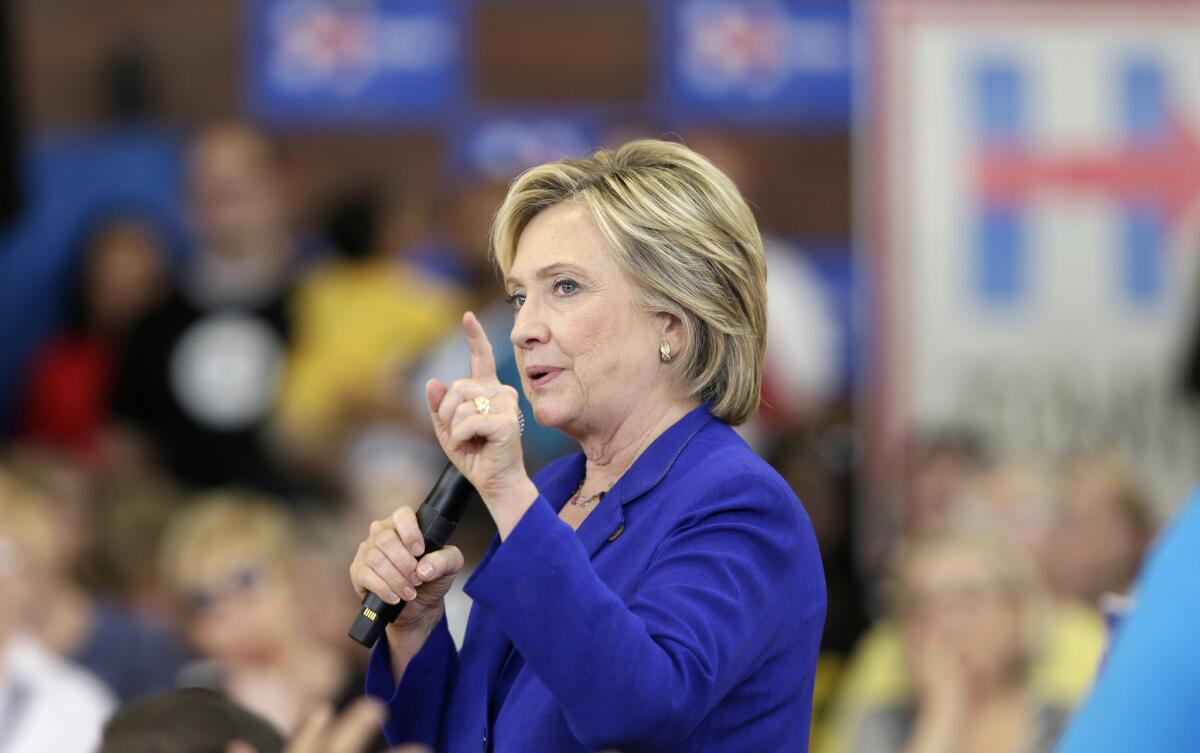
Democratic presidential candidate Hillary Rodham Clinton speaks in Des Moines last week. Another group of private emails from her tenure as secretary of State has been released.
A politician with ties to Hillary Clinton cited America's mass detention of Japanese Americans during World War II in a public announcement on Wednesday voicing his support for denying Syrian refugees the opportunity to resettle in the United States.
"I'm reminded that President Franklin D. Roosevelt felt compelled to sequester Japanese foreign nationals after the bombing of Pearl Harbor, and it appears that the threat of harm to America from [Islamic State] now is just as real and serious as that from our enemies then," Roanoke, Va., Mayor David Bowers said in the statement.
Bowers, a Democrat, endorsed Clinton's candidacy for the Democratic presidential nomination. It was an endorsement noted on Clinton's campaign website, but taken down on Wednesday.
"The internment of people of Japanese descent is a dark cloud on our nation's history and to suggest that it is anything but a horrible moment in our past is outrageous," Clinton's campaign said in a statement.
Trump holds strong New Hampshire lead; Rubio moves into second place
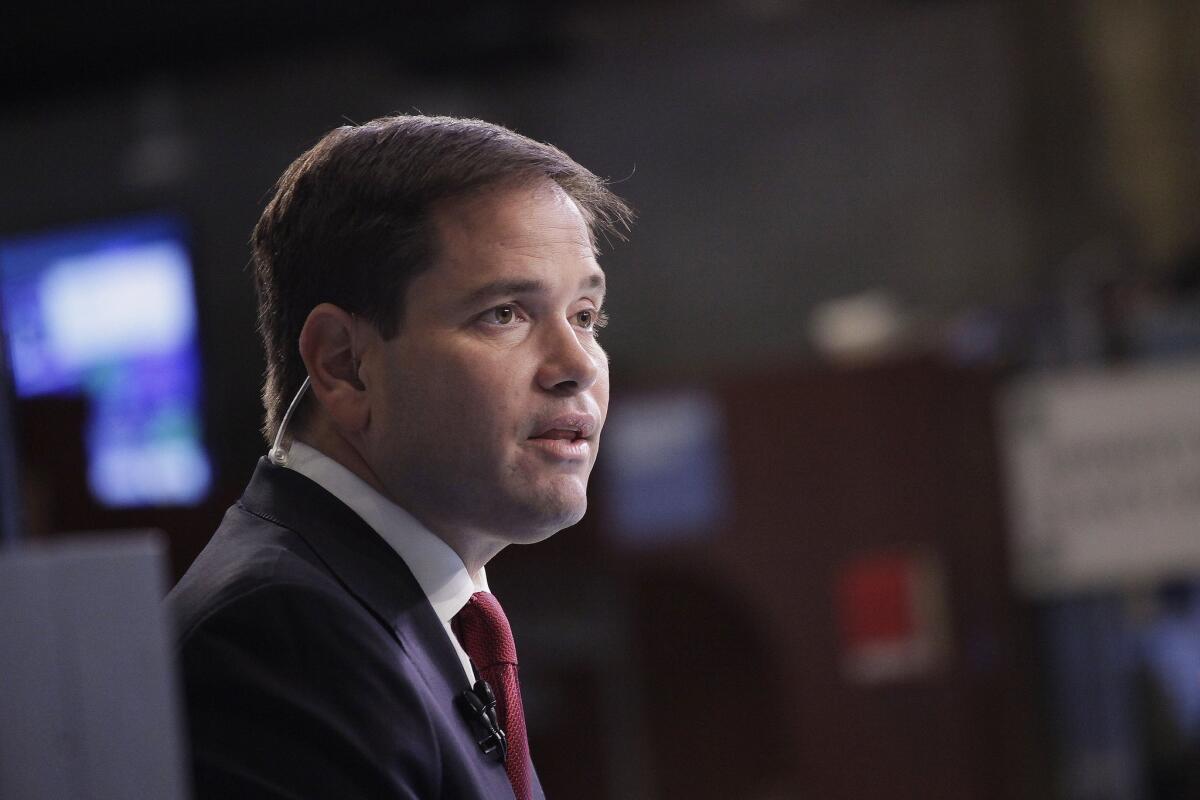
Donald Trump continues to hold a strong lead among Republican voters in New Hampshire, two polls released Wednesday show.
Sen. Marco Rubio of Florida may be moving into second place in the state that holds the first primary of the nominating season, the polls indicate.
A poll by WBUR-FM in Boston showed Trump has the support of 23% of Republican voters, while Rubio and Ben Carson were tied at 13%. That was a big drop for Carson, who had been nearly tied with Trump in a previous WBUR poll in September and a big jump for Rubio, who was in low single digits in the earlier survey. Sen. Ted Cruz of Texas was in fourth place, with 8%.
A poll by Fox News gave Trump 27%, Rubio 13% and Cruz 11%. Carson and Jeb Bush were at 9% in that survey. Bush got 7% in the WBUR survey.
Both polls showed Gov. Chris Christie of New Jersey at 6%. His backers have been talking up signs that he is regaining support in New Hampshire, where he has been spending large amounts of time. The two new surveys provide limited evidence of that.
For Christie and Bush, both one-time front runners in the GOP, New Hampshire has taken on great importance. Neither candidate is doing well in Iowa, the other state that kicks off the primary season, and reviving their campaigns will probably require either winning or coming in a strong second in New Hampshire.
Carson, by contrast, has shown strong support in Iowa. Evangelical Christians, who make up the core of Carson's support, are a major factor in Iowa but much less of one in New Hampshire.
The WBUR survey was taken over the weekend among 405 likely Republican primary voters. It has a margin of error of plus or minus 4.9 percentage points. The Fox News poll was taken Sunday through Tuesday among 353 likely Republican primary voters and has a margin of error of +/- 5 percentage points.
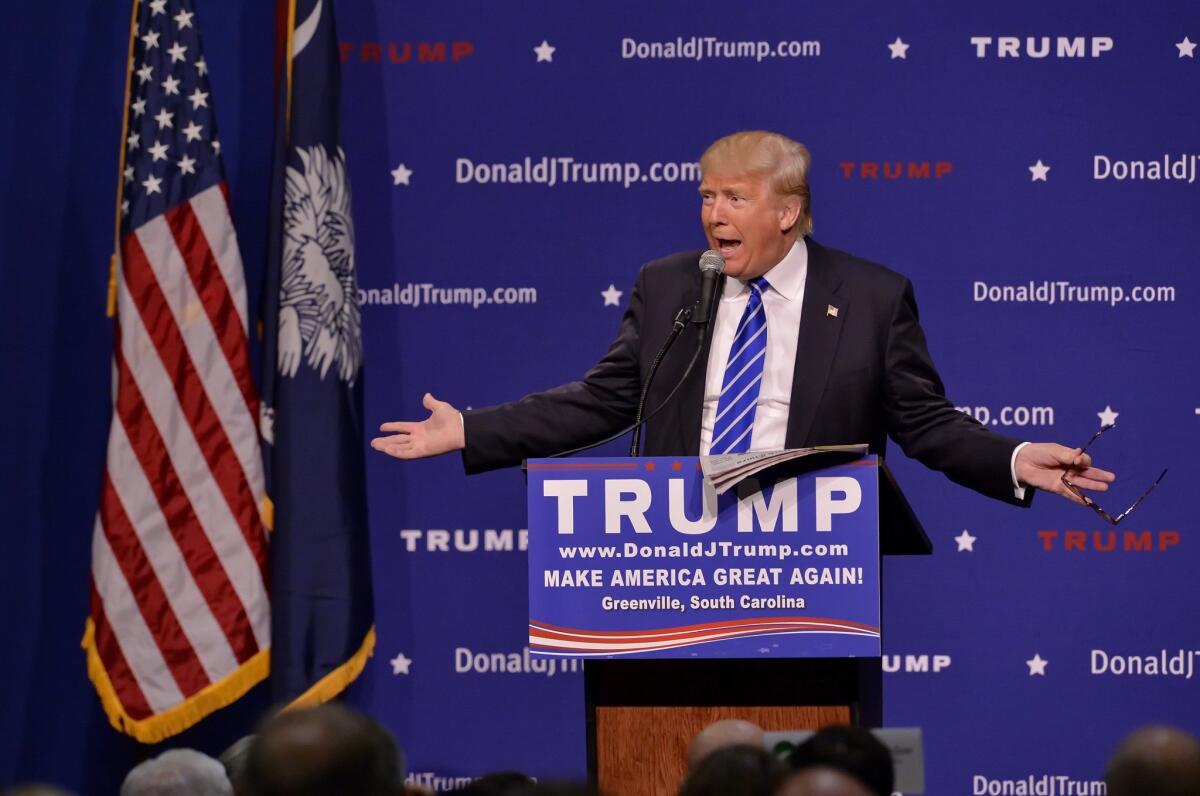
Republican presidential candidate Donald Trump exclaims that his hair is real to supporters during a rally in South Carolina in August.
Public agrees: Syrians shouldn’t be allowed in the U.S.
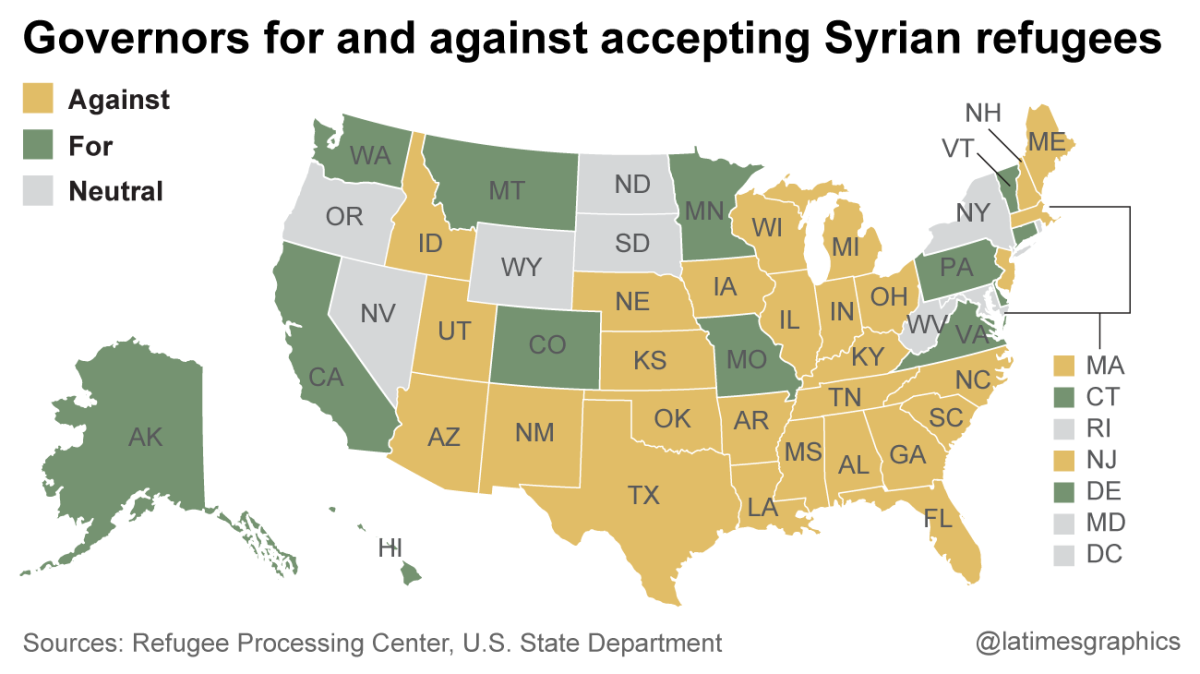
Note: A previous version of this map used the words “accept” and “against” in the key.
As Congress prepares to vote on a proposal to block most Syrian refugees from entering the U.S., there’s little question which side has the upper hand politically: Refugees from a conflict zone are not popular.
Two new polls taken in the aftermath of the Paris attacks show the public mood. A new NBC/SurveyMonkey poll shows that the public disapproves, 56%-41%, of “increasing the number of Syrian refugees coming into the country.” In a poll for Bloomberg, 53% of Americans said they think the U.S. should “not accept any Syrian refugees.”
To date, the U.S. has admitted about 2,500 Syrian refugees, about half of them children and most of the rest women. The Obama administration has proposed increasing that number to 10,000 in the next 11 months.
Republican officials have taken the lead in opposing that idea, and the polls show they are in tune with their constituents. By 81%-17% in the SurveyMonkey poll, Republicans opposed an increased number of refugees. Democrats split the other way, with 65% backing an increase and 31% opposed. Independents split down the middle.
Opposition to settling refugees is not a huge surprise — the public in 1939 disapproved of allowing refugees fleeing Hitler to enter the U.S., according to Gallup polling at the time.
The Bloomberg poll was taken by telephone Monday and Tuesday among 628 American adults and has a margin of error of +/-3.9 percentage points. The SurveyMonkey poll was done online Sunday through Tuesday with 5,755 American adults and has an error estimate of 1.9 percentage points.
In 2016 race, governors run into outside force
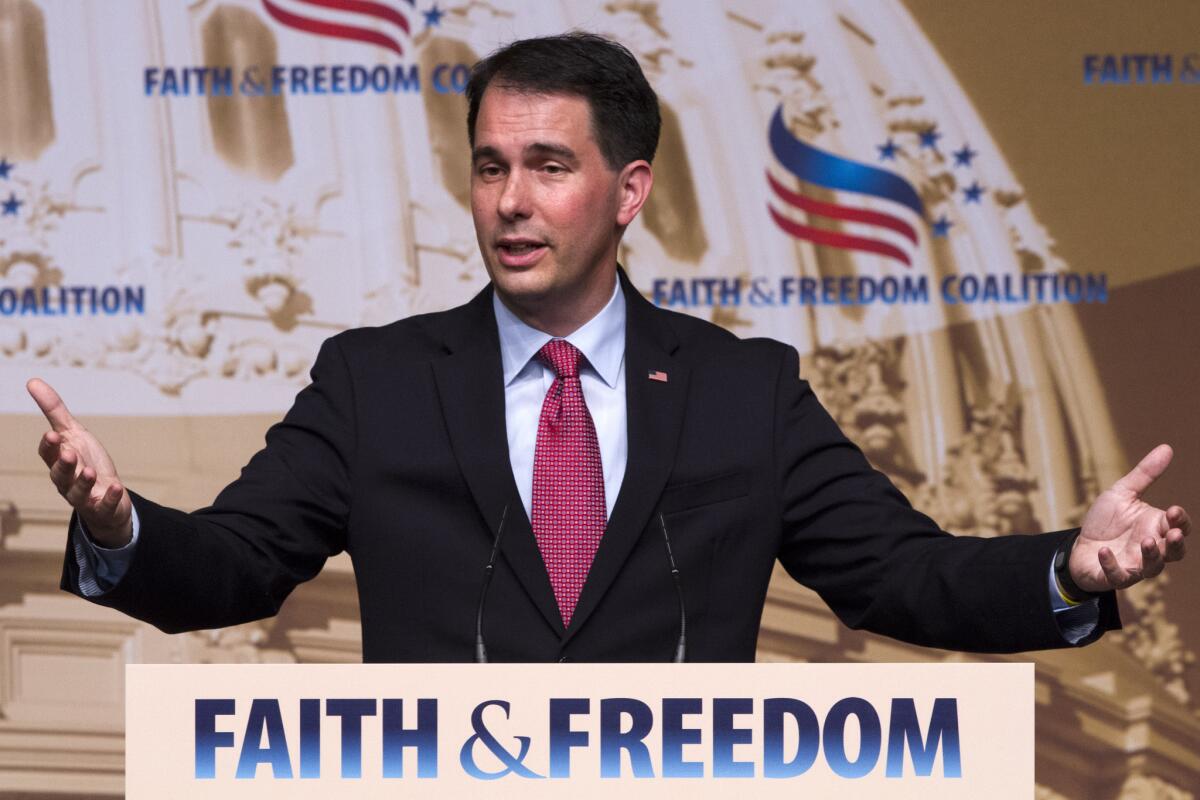
Wisconsin Gov. Scott Walker, a likely presidential candidate, has taken on public- and private-sector labor unions. Now, he’s targeting another revered liberal symbol: college professors.
With a combination of executive experience and conservative credentials, the slate of governors who sought the Republican nomination for president once appeared to be a strong group of contenders. But one after another, they have tumbled — while others among them barely remain afloat.
The latest was Louisiana Gov. Bobby Jindal, who abruptly ended his campaign on Tuesday. Former Texas Gov. Rick Perry and Wisconsin Gov. Scott Walker also have exited the race. Ohio Gov. John Kasich is polling in single digits, and New Jersey’s Chris Christie and former Arkansas Gov. Mike Huckabee are doing so poorly they were moved to the undercard for lower-tier candidates at the last GOP debate.
This year, Republican primary voters yearn for candidates with experience outside of politics, polls have shown. Donald Trump and Ben Carson, two men who have never held elected office but have strong backgrounds in business and medicine, have both led the field for months.
“People are tired of what they perceive as the same old thing out of Washington,” Walker said ahead of last week’s Republican debate in Milwaukee, at an event that served as a postmortem look at his failed campaign and the state of the 2016 race.
The governors’ campaign failures came as the result of several factors, including fundraising and expectations of support that never materialized. Jindal, for example, sought to tap into social conservatives in Iowa, but rivals including Carson and Texas Sen. Ted Cruz were more appealing to this voting bloc, surveys and interviews with operatives in the state showed. The same candidates usurped the support of evangelicals, a key voting bloc in the state’s GOP caucuses on which Walker had counted.
But their executive experience likely wasn’t a direct factor, said Stuart Stevens, a chief strategist for Mitt Romney, the 2012 Republican nominee.
“Was it because they held elected office and served as governors that they didn’t appeal to voters? It’s doubtful,” Stevens said. “It’s inevitable the field is going to winnow down. … It just so happens that the first couple of candidates out of the race have executive experience running states.”
Jindal also amassed just $579,000 in the last fundraising quarter, compared with Cruz’s $12 million.
“We were far behind,” Curt Anderson, a chief strategist for Jindal, told reporters Tuesday. “Say what you want — it takes money to win elections.”
An inability to raise cash also doomed Walker and Perry. When Walker exited the race in September, he was spending tens of thousands of dollars each day. According to campaign finance reports from the third quarter, he raised nearly $7.3 million and spent about $6.3 million.
Stevens said that with a crowded field, others are certain to drop out, likely before the Feb. 1 Iowa caucuses.
“Genuinely, I think there’s a strong perception that running for president is less difficult than it really is,” Stevens said. “When you get out there on the field, it can be tough to complete passes.”
Obama delivers sharp-edged criticism in the Syrian refugee debate
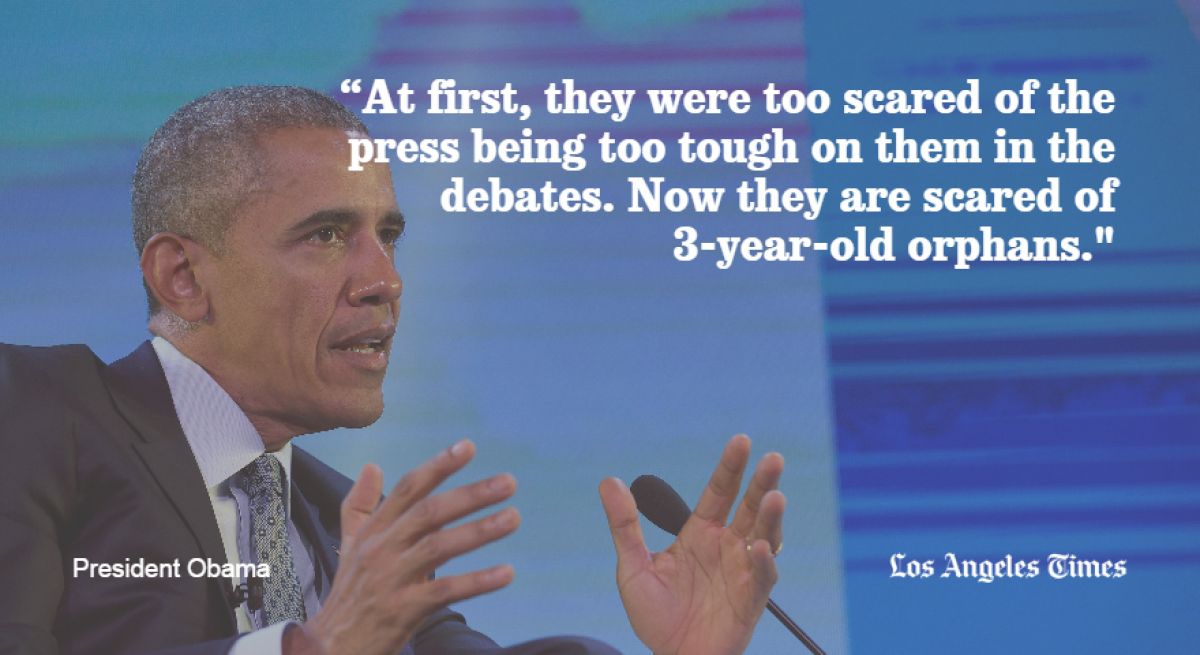
President Obama's role in the campaign is emerging as something like insulter-in-chief, and he took another shot at Republicans on Wednesday, scorning their calls for the U.S. to block Syrian refugees from resettling in the country. The Times' Michael A. Memoli was with Obama in Manila.
GOP candidates request 'equal time' on NBC
Several Republican presidential candidates have started cashing in on their right to equal air time after Donald Trump’s Nov. 7 hosting gig on "Saturday Night Live." Campaigns for Ohio Gov. John Kasich, Sen. Lindsey Graham of South Carolina, former Arkansas Gov. Mike Huckabee and former New York Gov. George Pataki requested the same 12 minutes and five seconds that rival Trump received on NBC.
Graham asked for time at seven affiliate stations in the early-voting states of Iowa and New Hampshire, according to CNN. Pataki asked for the same from 16 outlets in New Hampshire, South Carolina, Iowa and New York. Kasich did not yet clarify which affiliates he seeks in his request.
The Federal Communications Commission says candidates are entitled to equal time from a broadcaster when an appearance by one isn’t part of a newscast, news interview or news documentary. The regulations don’t determine what kind of broadcast that time must be part of. For example, NBC doesn’t need to offer each Republican presidential candidate time on "SNL" — the campaigns and the broadcaster negotiate the terms individually.
Rival candidates had seven days after Trump’s appearance to file requests. NBC does not expect any more letters.
Ben Carson's advisors disagree on his knowledge of foreign policy
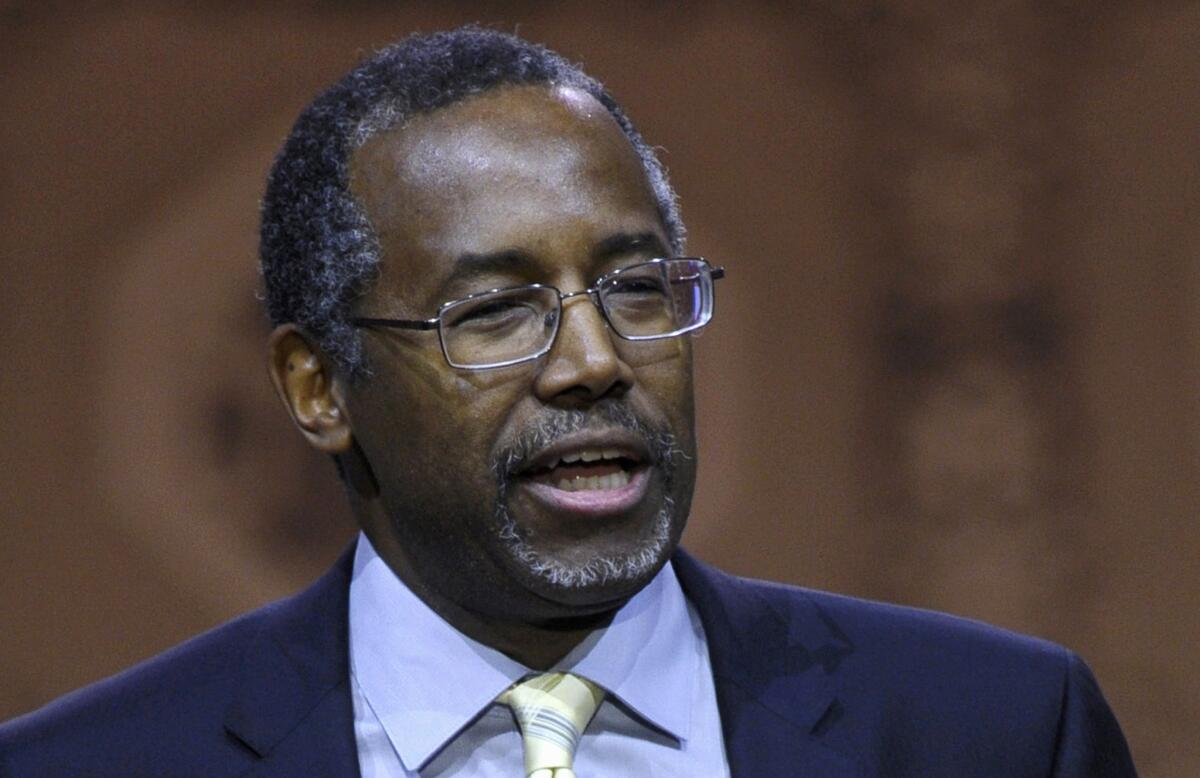
Questions about Ben Carson’s knowledge of foreign policy played out in public Tuesday with his campaign assailing an outside advisor who has helped brief the retired neurosurgeon.
Duane R. Clarridge, a former CIA agent and Carson’s friend and advisor, told the New York Times that “nobody has been able to sit down with [Carson] and have him get one iota of intelligent information about the Middle East.”
Clarridge added that Carson has weekly briefings to make “him smart” on overseas issues.
The comments come as the 2016 campaign begins to focus intently on foreign policy in the wake of recent terrorist attacks in Paris.
In debates, Carson has had hiccups on foreign policy. During last week’s gathering in Milwaukee, Carson said the Chinese are fighting in Syria – an assertion denied by U.S. and Chinese intelligence officials.
Following the Times’ report, Carson’s campaign looked to distance itself from Clarridge.
“Mr. Clarridge has incomplete knowledge of the daily, not weekly briefings, that Dr. Carson receives on important national security matters from former military and state department officials. He is coming to the end of a long career of serving our country,” said Doug Watts, a spokesman for Carson.
Moreover, he added that Clarridge is “clearly not one of Dr. Carson's top advisors,” saying the New York Times took “advantage of an elderly gentleman.”
The Times' political editor, Carolyn Ryan, denied such an assertion in an interview with Business Insider.
In recent polls Carson, along with Donald Trump, is leading in surveys in early voting states such as Iowa and South Carolina.
By the numbers
Get the L.A. Times Politics newsletter
Deeply reported insights into legislation, politics and policy from Sacramento, Washington and beyond. In your inbox three times per week.
You may occasionally receive promotional content from the Los Angeles Times.






